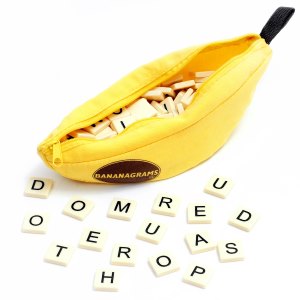
This game is loads of letter tiles in a banana-shaped pouch. That’s it. How much fun could that possibly be? Well let me tell you, get a small group of word game loving friends together and this will make any evening awesome.
It’s almost impossible to explain Bananagrams without also mentioning Scrabble, so I’m not even going to try. Everyone knows Scrabble or one of its derivatives, whether that’s a mobile game such as Words With Friends or the original board game, and most people who play will most likely share the same issues: it’s… quite… slow… to play… and unless you either put a time limit on each turn, or end up playing against someone with a PC for a brain, that game is going to go on for an hour. Not so Bananagrams – in fact if your game lasts more than 10 minutes you’ve been taking your time.
The reason for that is there’s no turns. Everyone plays at the same time, in a mainly-solitaire-but-not-quite style that induces so much panic you’d think you were trying to finish a game before it spontaneously caught fire. In the middle of the table are 144 tiles, all face down, all with letters on. Players take a few tiles (the exact number depends on the number of players) and as soon as someone shouts “Split!” everyone turns their tiles over and tries to arrange them into a crossword-esque merging pattern. If they manage it they shout “Peel!” (see, it’s all banana-based shouting here) and take another tile to try and fit into their words somehow, rearranging words as required. When someone yells “Peel” though, every other player needs to take a tile to add to their own collection, and in the process making their own job a tiny bit tougher. You can return dodgy tiles back to the middle if you like with a shout of “Dump!” (not sure of the banana link on that one if I’m honest) but for each tile returned you’ll have to take three more in its place.
Eventually the tiles in the middle will diminish so there are fewer than there are players. At which point the next person to finish their tiles shouts “Bananas!” and win. Maybe. It depends on whether other players find fault with any of their words – if they do, they’ve got a rotten banana, drop out of the game and return all of their tiles for others to pick up. And that’s all there is to learn. Simple, exciting, agonising and unbelievably tense at times.
Before reviewing this I was intrigued by how it had become such a hit so quickly. It looked interesting, but the pictures I saw just didn’t make me think it would be much to write home about. Well that’s because the pictures show the components, but doesn’t even hint at the frantic stress that envelops every game you play. And that’s the sole reason why I love Bananagrams so much – yeah I’m a bit geeky and love word games, but I also love games that make me want to scream while I’m playing, that make my heart pound as I’m so close to winning but just can’t fathom the final piece of the puzzle to make it all sit perfectly together. It’s even a game with single player variants, but while these are useful and quite fun there’s nothing quite like you and six others trying to figure out how to form connected words, all while people around the table are barking banana-based words at you. If you don’t like word games, and can’t stand the thought of a super fast-paced Scrabble style game, then avoid this like it was a tropical disease, but otherwise you should be looking to find a bunch of friends (they’re not the only ones who can do banana puns) and grab this as quickly as possible.

Leave a Reply